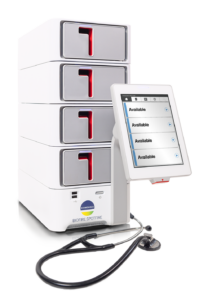Antimicrobial resistance (AMR) is not a future threat—it’s already a leading cause of death worldwide, with 4.95 million deaths associated with AMR in 2019.1 This growing threat is fueled by the misuse and overuse of antimicrobials, which enables the emergence and spread of bacteria, viruses, fungi, and parasites that have evolved to withstand the drugs designed to kill them.
Without effective antimicrobials, infections have the potential to become life-threatening. In fact, the unchecked spread of AMR has the potential to make routine healthcare ineffective or even dangerous.2
Effectively addressing the challenge of AMR requires action across countries, industries, and settings—including at the point of care.
Antimicrobial Use at the Point of Care
Outpatient settings like urgent care clinics or primary care offices are a crucial source of antimicrobial prescribing. Around 80–90% of the volume of human antibiotic use occurs in outpatient settings.3 However, much of that antimicrobial use is unnecessary or inappropriate.4
In ambulatory settings, for example, over 45% of antibiotics prescribed for respiratory diagnoses are inappropriate.5
Upper respiratory tract infections represent the top reason that patients visit primary care providers.6 Furthermore, antibiotics are frequently and inappropriately prescribed for viral respiratory infections.4 It is clear that outpatient settings are uniquely positioned to make an enormous impact in reducing unnecessary and inappropriate antimicrobial use.
Outpatient Antimicrobial Stewardship
Antimicrobial stewardship is a coordinated effort to encourage the appropriate use of antimicrobials. The goal is to maximize the benefit of antimicrobial treatment while minimizing harm to the patient
and reducing the spread of resistance. The CDC calls on healthcare organizations of every size—including outpatient clinics—to commit to optimizing antimicrobial use.7
The CDC offers a framework for outpatient antimicrobial stewardship, and one recommendation is to focus stewardship efforts on high-priority conditions for which clinicians commonly deviate from best practices for antimicrobial prescribing—like acute viral respiratory illnesses.7
The question becomes: What tools exist today to improve antimicrobial prescribing in the outpatient settings? Diagnostics can be powerful tools for optimizing antimicrobial use, giving clinicians the information they need to ensure antimicrobials are prescribed only when needed, and at the right dose and duration.
SPOTFIRE: Designed for the Point of Care
The BIOFIRE®SPOTFIRE® Respiratory Solution is changing the game in point-of-care settings, offering the power of PCR results in a point-of-care timeframe. The SPOTFIRE Respiratory Solution tests for a grouping of probable pathogens (either 5 or 15 targets) with results in about 15 minutes.
The BIOFIRE® SPOTFIRE® Respiratory Panel Mini identifies SARS-CoV-2, influenza A and B viruses, respiratory syncytial virus, and human rhinovirus, increasing the chance of getting an actionable answer. Fast, accurate PCR results may enable clinicians to make more informed diagnoses, optimize treatment, and avoid unnecessary antimicrobials.
A great deal of inappropriate antibiotic use is associated with viral respiratory tract infections.4 The SPOTFIRE Respiratory Solution can provide clinicians with diagnostic information to inform stewardship practices—prescribing the right drug for the right patient at the right dose for the right duration.
Upper respiratory tract infections represent the top reason that patients visit primary care providers.6 Furthermore, antibiotics are frequently and inappropriately prescribed for viral respiratory infections.4
Be a Game Changer
Urgent care settings are uniquely positioned to help slow the spread of AMR, and diagnostics are at the heart of antimicrobial stewardship initiatives. According to the CDC, “Diagnostics can be just as critical for fighting infections as antibiotics.”2
Together, we can help preserve antimicrobial efficacy today, and for future generations. Learn more about how the SPOTFIRE Respiratory Solution can empower your clinic in the global fight against AMR.
- Antimicrobial Resistance Collaborators. Lancet. 2022;399(10325):629-655.
- CDC. Antibiotic Resistance Threats in the United States, 2019. Accessed 21 Aug 2023. Retrieved from: https://www.cdc.gov/drugresistance/pdf/threats-report/2019-ar-threats-report-508.pdf
- Maillard JY, et al. Am J Infect Control. 2020 Sep; 48(9): 1090–1099.
- Fleming-Dutra KE, et al. JAMA. 2016;315(17):1864-1873.
- Shapiro DJ, et al. J Antimicrob Chemother. 2014;69(1):234-40.
- Finley CR, et al. Can Fam Physician. 2018 Nov; 64(11): 832–840.
- Sanchez GV, et al. Core Elements of Outpatient Antibiotic Stewardship. CDC. 2016;65(6):1-12.



